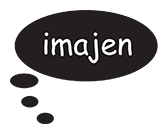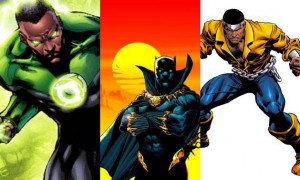 Mention two words, Black Superhero, to a group of white comic book nerds, and you will get a handful of answers from the most well-read comic nerdists. Mention the same two words to black comic book nerds, and you will likely get a few more than the first group. However, once you move the discussion outside of the inner circles of comic familiarity, to the layperson; Average Joe and Joan America, the game changes dramatically.
Mention two words, Black Superhero, to a group of white comic book nerds, and you will get a handful of answers from the most well-read comic nerdists. Mention the same two words to black comic book nerds, and you will likely get a few more than the first group. However, once you move the discussion outside of the inner circles of comic familiarity, to the layperson; Average Joe and Joan America, the game changes dramatically.
Marvel comics and DC comics, the Goliaths of the comic universe, have been the major forces driving the creation and defining images of superheroism since the 1930's. Needless to say, the 1930's weren't the best years for Black folks in America. -Any guesses when Black superheroes began to appear in comics? For those of you that said the mid 1960's, after the signing of the civil rights bill, give yourself a gold star.
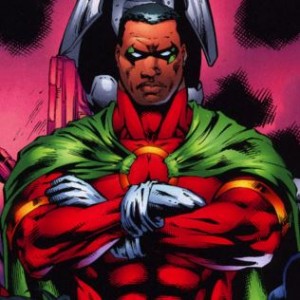 There was a span of 30 years in between the presentation of superheroes in comics to America, and the introduction of Black superheroes in comics. So, by the time that Black superheroes were introduced, three decades after the fact, there was already an established template; muscular, perfectly proportioned body in a tight spandex outfit with briefs worn on the outside, shin-high boots, a mask or hood, and possibly gloves and/or a cape.
There was a span of 30 years in between the presentation of superheroes in comics to America, and the introduction of Black superheroes in comics. So, by the time that Black superheroes were introduced, three decades after the fact, there was already an established template; muscular, perfectly proportioned body in a tight spandex outfit with briefs worn on the outside, shin-high boots, a mask or hood, and possibly gloves and/or a cape.
As the two Goliaths pumped out hero after hero, and inspired the creation of other comic book companies who unwittingly followed suit with the Marvel/DC superhero template, the "look" of a superhero became standardized. Pixar's 2004 animated film The Incredibles, poked fun at the costume of a superhero, with costume designer Edna Mode, expressing a particular contempt for the cape.
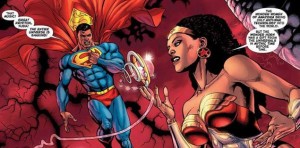 Nevertheless, even today, in 2015 artists continue to draw and define superheroes according to the Marvel/DC template. On social media, fanboys and fangirls have mock debates on "who would win" battles between proposed characters, and Black groups debate and campaign for certain Black celebrities and actors to portray superheroes in proposed film projects - even in cases where the character was created and drawn as white.
Nevertheless, even today, in 2015 artists continue to draw and define superheroes according to the Marvel/DC template. On social media, fanboys and fangirls have mock debates on "who would win" battles between proposed characters, and Black groups debate and campaign for certain Black celebrities and actors to portray superheroes in proposed film projects - even in cases where the character was created and drawn as white.
In the archives here you'll find articles continually addressing need for Black people to create our own projects. The need to define ourselves, lest we find ourselves continually defined by outside perceptions of us. More often than not, the outside perceptions range anywhere from the offensive; rehashed/repackaged stereotypes, to the half-baked; a shallow, ill-developed character without depth of dimension.
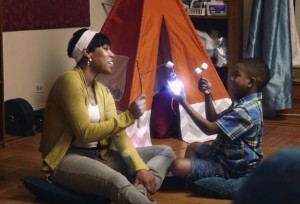 I was pleasantly surprised, however, to find a project created by Dennis Liu, an Asian actor/director. The project is entitled Raising Dion, the story of a widowed, single black mother, raising a black child that has superpowers. The concept presents a unique situation, and presents issues as concerns a black mother raising a black male child in America, as well as teaching a being to develop and control his powers.
I was pleasantly surprised, however, to find a project created by Dennis Liu, an Asian actor/director. The project is entitled Raising Dion, the story of a widowed, single black mother, raising a black child that has superpowers. The concept presents a unique situation, and presents issues as concerns a black mother raising a black male child in America, as well as teaching a being to develop and control his powers.
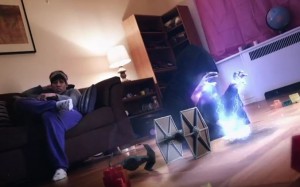 Raising Dion is a comic book, uniquely promoted with a Hollywood quality, live-action HD trailer, that could easily be used to promote an upcoming network television show. Personally, I am crossing my fingers that the concept is picked up as a cable or network series. Or at minimum, it will be developed into a web series.
Raising Dion is a comic book, uniquely promoted with a Hollywood quality, live-action HD trailer, that could easily be used to promote an upcoming network television show. Personally, I am crossing my fingers that the concept is picked up as a cable or network series. Or at minimum, it will be developed into a web series.
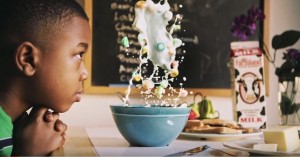 We need more projects like Raising Dion, whether they are created by Black people, or other people of color. Positive imagery and original concepts are what we are all about, so to Dennis Liu, we at Imajen salute you, sir.
We need more projects like Raising Dion, whether they are created by Black people, or other people of color. Positive imagery and original concepts are what we are all about, so to Dennis Liu, we at Imajen salute you, sir.
Raising Dion is a step in the positive direction, a step in the direction of originality, and a step away from the Marvel/DC template.
